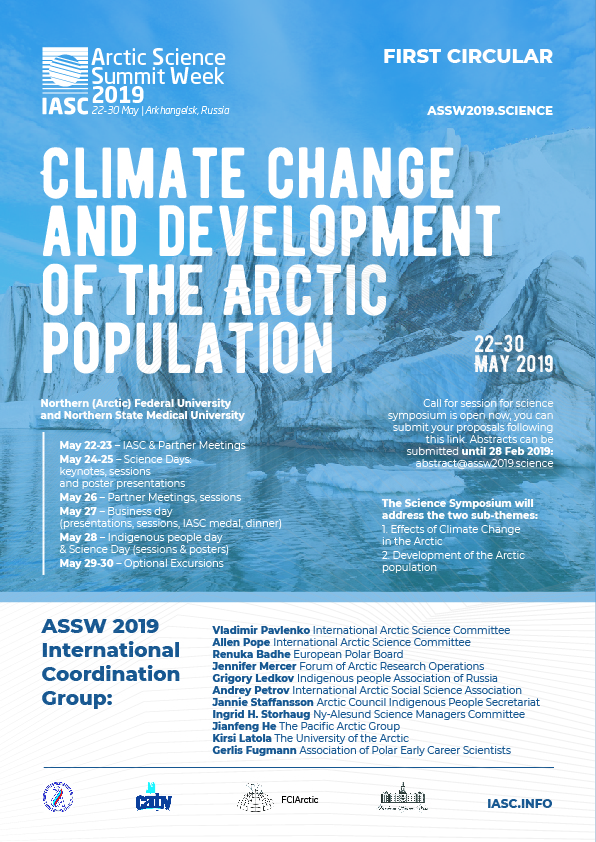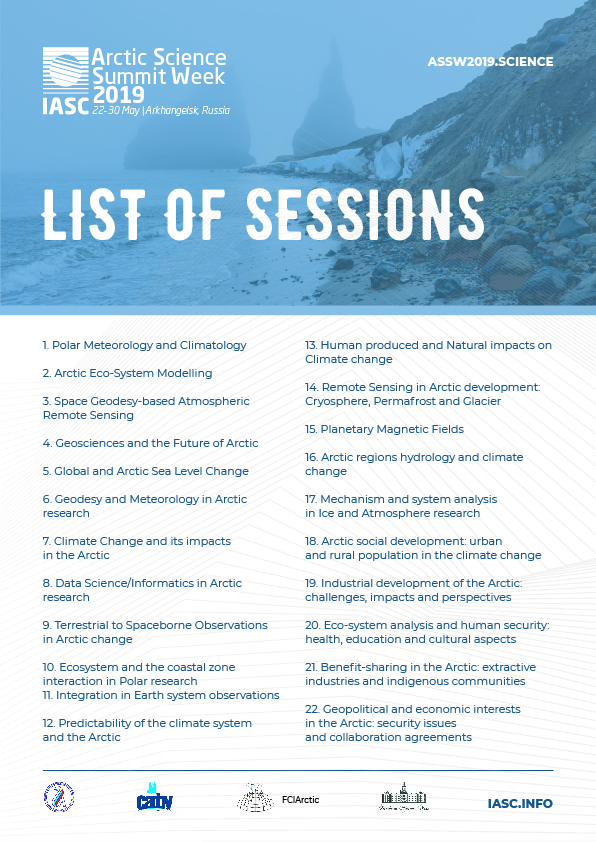The 21st Arctic Science Summit Week, established by the International Arctic Science Committee (IASC), is going to be held from 22 to 30 May 2019 in Arkhangelsk. The thematic focus of the summit in 2019 is "Climate Change and Development of the Arctic Population."
The Arctic Science Summit Week is the largest annual international meeting of scientists who support and promote Arctic research projects. ASSW contributes to international cooperation in all fields of Arctic research.
Russia is hosting such a significant event in the scientific world for the second time. Arkhangelsk has been chosen to host the summit, as it is the largest city in the Arctic. The main venues for the event are the Northern Arctic Federal University and the Northern State Medical University.
About 400 Russian and foreign scientists are expected to arrive in Arkhangelsk. For the first time, the city will receive such a considerable delegation of scientists from more than 23 countries conducting systematic research in the Arctic. Dozens of roundtables and discussions will take place, hundreds of reports and presentations will be delivered. Scientific sessions on 22 topical issues, closely interrelated with the thematic focus of the Week, will be held.
Hosting ASSW in Russia provides an opportunity to show the enormous potential of the country in researching, developing, and preserving the natural potential of the Arctic to the international scientific community. The topic of this scientific week is especially important for Russia, since the most Indigenous people, localities, and industrial centers in the Arctic are concentrated in its northern territories.
Schedule of the Arctic Science Week:
- May 22-23 - Meetings and sessions of IASC & partners
- May 24-25 - Days of Science: speakers' lectures, sessions, and poster presentations
- May 26 - Day of partners’ meetings, sessions, poster presentations
- May 27 - Business Day (presentations, sessions, the IASC medal award)
- May 28 - Indigenous Day and Science Day (sessions and poster presentations)
Among the main speakers are members of the Russian Academy of Sciences, representing various fields of science, well-known foreign researchers from the leading scientific centers of the Arctic and non-Arctic states, heads of the largest national companies of Russia, pursuing industrial and infrastructure development of the macroregion: Gazprom, Alrosa, Atomflot, USC of Russia, and representatives of the Arctic territories.
The summit will include the ceremony of the IASC medal - one of the most prestigious awards for Arctic research. The award is presented by the President of the IASC and is accompanied by a lecture by the laureate.
Participation in the Arctic Science Summit Week in Arkhangelsk will also provide early career scientists with exceptional opportunities to get new information and knowledge about the Arctic and get directly acquainted with the latest achievements in the research of the Arctic.
Abstract submission is 28 February, and the the deadline for application for visa letters for participation in the Summit is March 31. You can register on the website en.assw2019.science (still under construction). If you have any questions about the registration, please contact us via e-mail at info@assw2019.science.
We will be happy to welcome journalists at the event, they are also supposed to register on the website; you can send applications for organizing interviews and filming to media@assw2019.science. The photo bank and the video archive will be updated promptly during the forum.


Schedule of Days:
- May 22-23 – IASC & Partner Meetings
- May 24-25 – Science Days: keynotes, sessions and poster presentations
- May 26 – Partner Meetings, sessions
- May 27 – Business day (presentations, sessions, IASC medal, dinner)
- May 28 – Indigenous people day & Science Day (sessions & posters)
- May 29-30 – Optional Excursions
List of Sessions
- Polar Meteorology and Climatology
- Arctic Eco-System Modelling
- Space Geodesy-based Atmospheric Remote Sensing
- Geosciences and the Future of Arctic
- Global and Arctic Sea Level Change
- Geodesy and Meteorology in Arctic research
- Climate Change and its impacts in the Arctic
- Data Science/Informatics in Arctic research
- Terrestrial to Spaceborne Observations in Arctic change
- Ecosystem and the coastal zone interaction in Polar research
- Integration in Earth system observations
- Predictability of the climate system and the Arctic
- Human produced and Natural impacts on Climate change
- Remote Sensing in Arctic development: Cryosphere, Permafrost and Glacier
- Planetary Magnetic Fields
- Arctic regions hydrology and climate change
- Mechanism and system analysis in Ice and Atmosphere research
- Arctic social development: urban and rural population in the climate change
- Industrial development of the Arctic: challenges, impacts and perspectives
- Eco-system analysis and human security: health, education and cultural aspects
- Benefit-sharing in the Arctic: extractive industries and indigenous communities
- Geopolitical and economic interests in the Arctic: security issues and collaboration agreements
